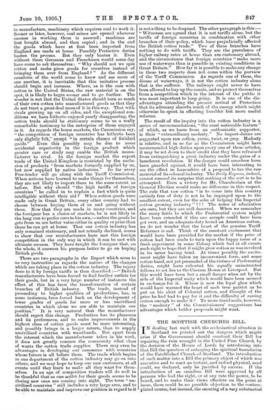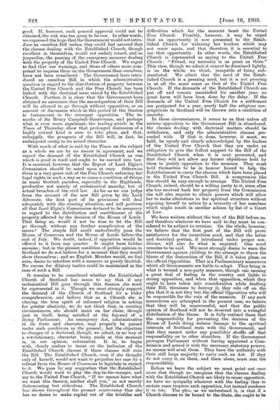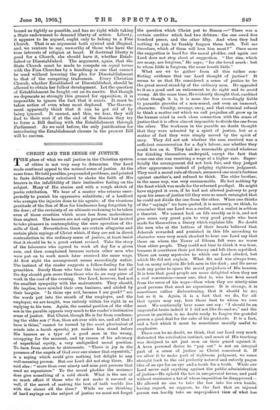THE SCOTTISH CHURCHES BILL. good. If, however, such general approval
could not be obtained, the risk was too great to be run. In other words, we expressed the hope that the Government would not intro- duce an omnibus Bill unless they could feel assured that the clauses dealing with the Established Church, though excellent in themselves, would not unduly retard, and so jeopardise, the passing of the emergency measure dealing with the property of the United Free Church. We regret to find that our warnings, and those of others more com- petent to impress them on the Government than ourselves, have not been considered. The Government have intro- duced an omnibus Bill in which the administrative question in regard to the distribution of property between the United Free Church and the Free Church has been linked with the doctrinal issue raised by the Established Church. Further, it is clear that the Government have obtained no assurance that the second portion of their Bill will be allowed to go through without opposition, or an amount of discussion which at this period of the Session is tantamount to the strongest opposition. The re- marks of Sir Henry Campbell-Bannerman, and perhaps what is even more significant, the leading article in the Times of Thursday, show that prolonged discussion of a highly critical kind is sure to take place, and that, unhappily, the prospects of the Bill will, in fact, be endangered owing to its mixed character.
With much of what is said by the Times on the subject as a whole we are by no means in agreement, and we regard the demand of the Established Church as one which is good in itself and ought to be carried into law. It is essential, however, that the Report of Lord Elgin's Commission should be acted upon at once. Otherwise there is a very grave risk of the Free Church enforcing her legal rights in such a way as to cause a condition of things in many Scottish parishes, especially in the Highlands, productive not merely of ecclesiastical anarchy, but of actual breaches of the civil law. As far as we can judge from the account of the new Bill given by the Lord Advocate, the first part of its provisions will deal adequately with the existing situation, and will perform all that Lord Elgin's Commission declared to be necessary in regard to the distribution and resettlement of the property affected by the decision of the House of Lords. That being so, would it not be wise to let the Bill go through without any further complication of the issues ? The simple Bill could undoubtedly pass the House of Commons and the House of Lords before the end of July. We doubt, indeed, if opposition would be Offered to it from any quarter. It might have hidden enemies ; but in the present condition of public opinion in Scotland we do not believe for a moment that they would show themselves ; and no English Member would, we feel sure, desire to interfere with a measure so purely Scottish. No excuse for dilatory tactics could be maintained in the case of such a Bill.
It. remains to be considered whether the Established Church of Scotland has cause to say that if any ecclesiastical Bill goes through this Session she must be represented in it. Though we most strongly support the demand of the Church of Scotland for a wider comprehension, and believe that as a Church she is obeying the true spirit of reformed religion in asking for greater elasticity, we do not think that, in existing circumstances, she should insist on her claim, though just in itself, being satisfied at the fag-end of a dying Parliament. An emergency Act, administrative in its form and character, may properly be passed under such conditions as the present ; but the objection to changes of a doctrinal, though, we admit, in no way of a revolutionary, character being made at this moment is, in our opinion, substantial. It is, to begin with, clearly useless to insist on the inclusion of the Established Church clauses if those clauses will ruin the Bill. The Established Church, even if she thought only of herself, would not want to prejudice her case by a refueal from the House of Commons to legislate in regard to it. We pass by any suggestion that the Established Church would want to play the dog-in-the-manger, and say to the United Free Church, "If we cannot have what we want this Session, neither shall you," as not merely dishonouring but ridiculous. The Established Church has shown throughout the present controversy that she has no desire to make capital out of the troubles and difficulties which for the moment beset the United Free Church. Possibly, however, it may be urged that an opportunity is now presented to the Estab- lished Church for widening her borders which may not occur again, and that therefore it is essential to use that opportunity. In other words, the Established Church is represented as saying to the United Free Church : "Friend, my necessity is as great as thine." This view, though we admit it cannot be dismissed lightly, is on the whole, we think, incapable of being sub- stantiated. We admit that the need of the Estab- lished Church is a pressing need, but it is not pressing in at all the same sense as that of the United Free Church. If the demands of the Established Church are put off and remain unsatisfied for another year, no great harm will have been done by the delay. If the demands of the United Free Church for a settlement are postponed for a year, nearly half the religious con- gregations in Scotland will be thrown into a condition of anarchy.
In these circumstances, it seems to us that unless all serious opposition to the Government Bill is abandoned, the clauses dealing with doctrinal matters should be withdrawn, and only the administrative clauses pro- ceeded with. If that is done, however, it must, we hold, be openly and clearly acknowledged by the leaders of the United Free Church that they are under an obligation to give the fullest support to the Bill of the Established Church when it is next presented, and that they will not allow any former objections held by them to justify opposition to the measure. They must hold themselves to be in honour bound to help the Establishment to carry the clauses which have been placed in the United Free Church Bill. A compromise like this should be easy enough to arrange. The United Free Church, indeed, should be a willing party to it, since after she has received back her property from the Commission she will also require to obtain powers which will allow her to make alterations in her spiritual structure without exposing herself to action by a minority of her members which might result in another schism by fiat of a." Court of Law.
We have written without the text of the Bill before us, and. therefore whatever we have said to-day must be con- sidered to be subject to revision. On the whole, however, we believe that the first part of the Bill will prove satisfactory for the immediate need, and that the latter and doctrinal portion, if introduced under proper con- ditions, will also do what is required. One word remains to be said. We most strongly desire to warn the Government against yielding to the attempt to throw the blame of the destruction of the Bill, if it takes place, on the official Opposition. That is a Parliamentary manceuvre which all Governments are liable to adopt. They bring in what is termed a non-party measure, though one causing a great deal of feeling in the country and liable to strong opposition, and when that opposition, which they ought to have taken into consideration while drafting their Bill, threatens to destroy it, they ride off on the plea that it is not they but the official Opposition who will be responsible for the ruin of the measure. If any such manoeuvres are attempted in the present case, we believe that they will be unsuccessful, and that the public opinion of Scotland will not be deceived into a wrongful distribution of the blame. It is fully realised there that the responsibility for preventing the decision of the House of Lords doing serious damage to the spiritual interests of Scotland rests with the Government, and that they cannot under any possibility shuffle off that responsibility on to other shoulders. If the Government prorogue Parliament without having appointed a Com- mission and armed it with the necessary statutory powers, no excuse will avail them. They have the authority with their still large majority to carry such an Act. If they do not carry it, on them, and them alone, must rest the responsibility.
Before we leave the subject we must point out once more that though we recognise that the clauses dealing with the Established Church are likely to cause opposition, we have no sympathy whatever with the feeling that in certain cases inspires such opposition, but instead condemn it in tote. The plea, as we understand it, is that if a Church chooses to be bound to the State, she ought to be
bound as tightly as possible, and has no right while taking a State endowment to demand liberty of action. Liberty, it appears to be argued, ought only to belong to a Free Church. That is an argument both cynical and illogical, and, we venture to say, unworthy of those who have the true interests of religion at heart. If doctrinal liberty is good for a Church, she should have it, whether Estab- lished or Disestablished. The argument, again, that the State Church must be made to compete on equal terms with the Free Churches by a handicap is one that cannot be used without lowering the plea for Disestablishmeut to that of the competing tradesman. Every Christian Church, whether Established or Disestablished, should be allowed to obtain her fullest development. Let the question of Establishment be fought out on its merits. But though we deprecate so strongly this ground for opposition, it is impossible to ignore the fact that it exists. It must be taken notice of even when most deplored. The Govern- ment apparently think that it can be got rid of by being ignored. It cannot, and this, we fear, they will find to their cost if at the end of the Session they try to force a Bill dealing with the Establishment through Parliament. As we said before, the only justification for introducing the Establishment clauses in the present Bill will ba success.








































 Previous page
Previous page